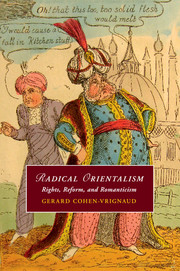16 results
7 - Hopeless Romanticism
-
-
- Book:
- Percy Shelley for Our Times
- Published online:
- 07 March 2024
- Print publication:
- 14 March 2024, pp 156-175
-
- Chapter
- Export citation
Chapter 11 - Orientalism
- from Part II - Political, Social and Intellectual Transformations
-
-
- Book:
- Byron in Context
- Published online:
- 04 October 2019
- Print publication:
- 05 December 2019, pp 93-100
-
- Chapter
- Export citation
Illustrations
-
- Book:
- Radical Orientalism
- Published online:
- 05 July 2015
- Print publication:
- 30 July 2015, pp vi-vii
-
- Chapter
- Export citation
Chapter 3 - Splendors and miseries of the British sultanate
-
- Book:
- Radical Orientalism
- Published online:
- 05 July 2015
- Print publication:
- 30 July 2015, pp 100-140
-
- Chapter
- Export citation
Chapter 4 - Reasoning like a Turk
-
- Book:
- Radical Orientalism
- Published online:
- 05 July 2015
- Print publication:
- 30 July 2015, pp 141-177
-
- Chapter
- Export citation
Chapter 1 - Cruel and unusual romance
-
- Book:
- Radical Orientalism
- Published online:
- 05 July 2015
- Print publication:
- 30 July 2015, pp 24-61
-
- Chapter
- Export citation
Acknowledgements
-
- Book:
- Radical Orientalism
- Published online:
- 05 July 2015
- Print publication:
- 30 July 2015, pp viii-x
-
- Chapter
- Export citation
Bibliography
-
- Book:
- Radical Orientalism
- Published online:
- 05 July 2015
- Print publication:
- 30 July 2015, pp 236-252
-
- Chapter
- Export citation
Introduction
-
- Book:
- Radical Orientalism
- Published online:
- 05 July 2015
- Print publication:
- 30 July 2015, pp 1-23
-
- Chapter
- Export citation
Index
-
- Book:
- Radical Orientalism
- Published online:
- 05 July 2015
- Print publication:
- 30 July 2015, pp 253-262
-
- Chapter
- Export citation
Contents
-
- Book:
- Radical Orientalism
- Published online:
- 05 July 2015
- Print publication:
- 30 July 2015, pp v-v
-
- Chapter
- Export citation
Copyright page
-
- Book:
- Radical Orientalism
- Published online:
- 05 July 2015
- Print publication:
- 30 July 2015, pp iv-iv
-
- Chapter
- Export citation
Chapter 2 - Reading the Oriental riot act
-
- Book:
- Radical Orientalism
- Published online:
- 05 July 2015
- Print publication:
- 30 July 2015, pp 62-99
-
- Chapter
- Export citation
Chapter 5 - Byronic infidelity and despotic individuality
-
- Book:
- Radical Orientalism
- Published online:
- 05 July 2015
- Print publication:
- 30 July 2015, pp 178-217
-
- Chapter
- Export citation
Notes
-
- Book:
- Radical Orientalism
- Published online:
- 05 July 2015
- Print publication:
- 30 July 2015, pp 218-235
-
- Chapter
- Export citation

Radical Orientalism
- Rights, Reform, and Romanticism
-
- Published online:
- 05 July 2015
- Print publication:
- 30 July 2015



